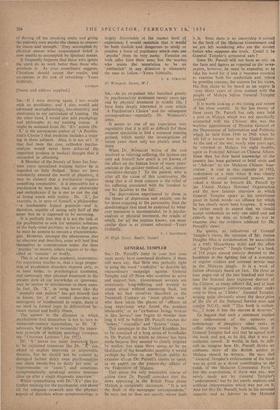Sta,---If I were starting again, I too would stick to
psychiatry; and 1 also would add advanced neurophysiology, bio-chemistry and electronics to my curriculum of training. On the other hand, I would also add psychplogy and philosophy to my- training course. It might be assumed from Dr. X's' article (Dr. ' X' is the anonymous author of A Psychia- trist's Choice') that medicine includes a train- ing in these subjects. Alas, it is not so ! If that had been the case, orthodox psycho- analysis would never have achieved the important position in medical thought that it succeeded in obtaining.
A Member of the Society of Jesus has four- teen years specialised training before he is regarded as fully fledged. Since we have voluntarily entered the world of phantasy, it may be claimed that a psychiatrist requires something comparable. It is impossible for a psychiatrist to turn his back on philosophy and metaphysics if he is not to run the risk of losing touch with reality. Dr. ' X', for example, is, in spite of himself, a philosopher —a mechanistic logical positivist—and is, therefore, capable of seeing only half of the scene that he is supposed to be surveying. largely discernable at the mental level of experience, I would maintain that it would he both foolish and dangerous to study or practise a form of psychiatry which cuts out ' psyche' from its very name. Fanatics on both sides have their uses; but the teaches who resists the temptation to be an ' enthusiast' in any direction is ultimately the man to follow.—Yours faithfully,
E. B. STRAUSS
45 Wimpole Street, W.I Sta,—As an ex-patient who benefited greatly by psychoanalytic treatment twenty years ago and by physical treatment in middle life,. 1 have been deeply interested in your article ' A Psychiatrist's Choice' and the subsequent correspondence—especially Dr. Winnicott's letter, It seems to one of my experience very regrettable that it is still so difficult for these eminent specialists to find a common meeting ground, which surely the investigations of recent years show only too plainly must be there.
When Dr. Winnicott writes of the cost involved in relieving suffering, the layman can only ask himself how much is yet known of the effect on the human brain of many years' analysis or the quicker method of, say, electro- convulsive-therapy ? To the patient, who is after all the cause of this controversy, the thing that is of most concern is the relief of his suffering associated with the freedom to use his faculties to the full.


































 Previous page
Previous page